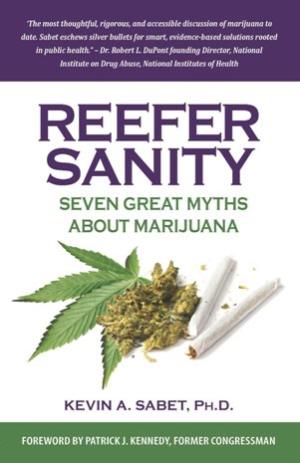Hemp advocates are emboldened by last month's Justice Department guidance on marijuana reform in the states and are moving forward, both on Capitol Hill and in the states.
Meet the new, kinder, gentler voice of public health neo-prohibitionism. We review Kevin Sabet's "Reefer Sanity."
Now more than ever, StoptheDrugWar.org needs your financial support to continue to provide this crucial informational tool that builds and empowers the movement. We have a special new offer for those donating $50 or more, which this post provides some updated information about.
For all that talk about drug law reform, the cops continue to do what they've always done. The FBI reports that drug arrests actually inched upward last, although marijuana arrests dropped (almost imperceptibly).
First, a District decriminalization bill was filed. Now, a marijuana legalization bill has been filed in the nation's capital. Public opinion there supports both efforts, and activists are ready to move with an initiative if the council falters.
In its annual exercise in arrogance, the US government last Friday released its report on who is and isn't complying with our drug war demands. Bolivia and Venezuela were singled out, and they're not happy.
A California dispensary regulation bill dies, the dark ages return to San Diego, Massachusetts towns enact moratoria, New Jersey gives a loan to a dispensary, and more.
A Missouri technical college's bid to drug test students for "public safety" reasons was largely slapped down by a federal district court judge Friday.
Public opinion has tipped in favor of marijuana reform in Michigan, with nearly half of respondents calling for outright legalization and more than two-thirds embracing either decriminalization or legalization.
A California man volunteering to help with marijuana eradication in the state's national forests died Thursday when he fell out of a helicopter. That's the 29th drug war death so far this year.
A killer Utah narc gets fired, a New Jersey cop goes around the bend, an Illinois deputy gets caught stealing from the cookie jar, an Arizona Border Patrol agent goes away for smuggling weed, and a New York City prison guard goes away for soliciting cocaine bribes.
Interns are making an important difference fighting the good fight with us at StoptheDrugWar.org.
It's not just medical and legal marijuana states that watched the Justice Department's announcement of its response to marijuana law reforms in the states with interest. Nine states have laws regulating the production of industrial hemp, and ten more have asked Congress to remove barriers to industrial hemp production.

Rep. Massie, Comm. Comer & Rep. Polis (Vote Hemp via youtube)
Hemp is also moving in the Congress. An amendment to the Farm Bill cosponsored by Reps. Earl
Blumenauer (D-OR), Thomas
Massie (R-KY), and Jared
Polis (D-CO) passed the House on a vote of 225-200 in July and will now go to a joint House-Senate conference committee. And the Industrial Hemp Farming Act (
House Resolution 525 and
Senate Bill 359) is pending in both chambers.
At a Tuesday Capitol Hill briefing organized by the industry group Vote Hemp (video embedded below), state and federal elected officials said they thought the Justice Department's policy directive on marijuana opened the door not just to regulated medical and legal marijuana, but also to industrial hemp production. Some states intend to move forward, they said.
"That Department of Justice ruling pertained to cannabis," said Kentucky Agriculture Commissioner John Comer, "and hemp has always been banned because it's in the cannabis family. The Department of Justice ruling pertained to states with a regulatory framework for cannabis, and we feel that includes hemp as well. Our legislation set up a regulatory framework."
The legislation Comer is referring to is Kentucky Senate Bill 50, the Bluegrass State's industrial hemp bill, which passed the legislature with bipartisan support, gained endorsements by both of the state's Republican US senators, Mitch McConnell and Rand Paul, and became law without the governor's signature in April. It establishes an Industrial Hemp Commission and sets up procedures for licensing farming and processing.
"We have a hemp commission meeting Thursday, and we are going to request that Rand Paul send a letter to the DEA telling them we intend to get going next year unless the Department of Justice tells us otherwise," Comer said. "We are taking a very proactive stance in Kentucky. We've been trying to replace tobacco, and hemp is an option not only for our farmers, but it could also create manufacturing jobs in our rural communities."
The commission did meet Thursday, and it voted unanimously to move forward with industrial hemp production, aiming at producing hemp next year.
"That's our first goal, to get the crop established. Then, once companies and industries see that we have a crop here established and growing, we believe industries will start coming here looking for it instead of importing it from other countries," said Brian Furnish, chairman of the Industrial Hemp Commission, after the Thursday vote.
According to Vote Hemp, Kentucky isn't the only state planning on moving forward with hemp next year. Vermont just released its Hemp Registration Form that allows farmers to apply for hemp permits and the Colorado Department of Agriculture is developing regulations to license hemp farmers in 2014. North Dakota has issued permits for several years now.
Imported hemp is now a $500 million a year industry, Vote Hemp's Eric Steenstra said.
Congressman Thomas Massie (R-KY), who also played an important role in passing the Kentucky bill and who is a cosponsor of the House hemp bill, said he was encouraged by the Justice Department policy directive, but that it was not enough.
"We need more than a Justice Department ruling," he told the press conference. "As a farmer and entrepreneur, I want some certainty. I want a legislative remedy for this, and that's why I continue to push hard for our bill, which would exclude hemp from definition as a controlled substance."

Vote Hemp's Eric Steenstra
But while the House hemp bill now has 47 cosponsors, it still has a long row to hoe. The hemp amendment to the Farm Bill, which would allow hemp production for university research purposes, has already passed the House and awaits action in conference committee.
"If you can attach an amendment to a spending bill, then you can get action," said Massie. "I have to give credit to Rep. Polis for doing this. This is a farm issue, not a drug issue. And while there was debate over whether it was wise to even have a vote, it passed. People decided spontaneously to vote for it as an amendment."
While the Senate has not passed a similar provision, Massie said he was hopeful that it would make it through conference committee.
"There is no equivalent in the Senate, there is no companion amendment, but we do have [Senate Minority Leader] Mitch McConnell, who is all for it," he said. "I'm hopeful it will survive, and we'll continue to work on the standalone hemp bill."
"It was important to get the House language in the Farm Bill," said Polis. "Not only does it allow universities to do research that is needed, but it also symbolically moves forward with embracing the potential for industrial hemp production."
Polis said he was cheered by the Justice Department's policy directive when it came to hemp.
"They listed eight enforcement priorities, and industrial hemp isn't even on the enforcement radar," the Boulder congressman said. "We see no federal interest in going after states or hemp producers. The risk is minimal. But minimal isn't good enough for some folks, and that's why we want to continue to gather support for the Industrial Hemp Farming Act. You don't want to have to depend on a federal prosecutor or the attorney general not getting up on the wrong side of the bed in the morning."
Industrial hemp may be an afterthought for Justice Department policy setters, but the recent guidance has emboldened hemp advocates to push forward faster than ever. Getting hemp research approved in the Farm Bill would be a good first step; passing the Industrial Hemp Act would be even better. But it doesn't look like some states are going to wait for Congress to act.
back to top
Chronicle Book Review: Reefer Sanity: Seven Great Myths About Marijuana by Kevin Sabet (2013, Beaufort Books, 198 pp., $14.95 PB)
Kevin
Sabet, or "Kevin
Sabet, Ph.D.," as he likes to be known, is becoming the go-to guy for arguments against marijuana legalization. A former senior advisor in the drug czar's office, he, along with former Congressman (and recovered pain pill popper) Patrick Kennedy, are the men behind
Project SAM (Smart Approaches to Marijuana), an organization created to stem the tide toward marijuana legalization. His
op-ed pieces now pop up with some regularity, and earlier this month, he appeared before the Senate Judiciary Committee as the lone witness to raise the alarm about looming legalization in Colorado, Washington, and beyond. (He was undoubtedly invited to testify at the behest of Chuck
Grassley, the octogenarian Iowa Republican who appears to be the only Reefer Madness-style politician left on the committee.)
Now, Sabet has organized and expanded his arguments in book form, and people interested in changing the marijuana laws will be seriously remiss if they fail to read, understand, and address them. Not because they are necessarily correct, but because Sabet is this generation's gentler, kinder voice of marijuana prohibition. The arguments Sabet makes in Reefer Sanity are sure to be used as ammunition by the foes of reform; count on them being echoed across the land as the debate spreads from state to state.
The important thing to know about Sabet is that he generally approaches marijuana policy from a public health perspective. For him, policy is about preventing marijuana use in the first place and then reducing the harms of its use (see below) when prevention fails. Yes, he still wants to arrest you, but only for the kinder, gentler reason of getting you into forced drug treatment.
But his focus on harms exposes a curious lacuna in his thinking: he never addresses the benefits of smoking marijuana, or drinking booze, or whatever other drug is in question. An argument that says only that X number of teen potheads will go schizophrenic or that X number of marijuana users will get in car wrecks or that marijuana use will cost X dollars in increased health care costs, but that fails to note that 1000X pot smokers will endure sweet moments of bliss, hilarity, and camaraderie is an argument with half the equation missing.
Yes, we have a certain number of alcoholics. We also have tens of millions of people who derive pleasure from sipping a fine California cabernet sauvignon with dinner or enjoying a cold, cold beer during a hot summer ball game. And even someone beginning his day with a cup of coffee and a cigarette (addictive substances both) derives some small pleasure from doing so. It's hard to put a dollar figure on such positives, and even harder when you don't even consider them.
Before getting into specifics, my other major problem with Sabet's approach is his willingness to use the coercive power of the state to make us conform to his vision of the public health. As Ethan Nadelmann is fond of putting it, "absent harm to others" the state should just butt out. Sabet doesn't want people thrown in prison or jail for marijuana; he wants them thrown in coerced treatment. He doesn't want people to suffer the life-long consequences of a marijuana arrest; he just wants to arrest them to "help" them. (Sabet would like to see marijuana possession arrest records disappear so as to not hurt one's future chances, but he still wants to arrest you for your own good.)
This is the danger when the nice-sound label "public health approach" gets stuck onto what is really still a criminal justice approach, with what is arguably a public health component tacked on. We trade cops, arrest, and imprisonment for cops, arrest, and treatment. But we still have the cops and we still have the arrests, and with the treatment component, we get extended surveillance and control by the state. There is a really human liberty interest here of which those, like Sabet, who can only conceive of drug use in terms of human slavery, are almost totally blind.
Sabet constructs his book around "Seven Great Myths About Marijuana." Here they are, with my briefest of responses. (I'm counting on the rest of you out there to do the detailed responding to his arguments; I'll limit myself to general comments here.)
Myth #1: Marijuana is Harmless and Non-Addictive. I don't know too many serious reformers who would make this argument, but they would say that its harms in most cases are minimal and that it's addictive in the same sense that a substance like coffee is addictive. And the dreaded withdrawal syndrome is about as horrendous as going off coffee. Not to mention that there are many people Sabet would qualify as "marijuana addicts" who nonetheless manage to lead happy, productive, creative lives.
Myth #2: Smoked or Eaten Marijuana is Medicine. What I find interesting about this section is the way it illuminates a growing divide between people who believe only in standardized, pharmaceuticalized Western medicine and people more inclined to accept naturalistic remedies. For Sabet, if it ain't a pill manufactured by a drug company, it ain't medicine. For medical marijuana supporters (and many others), however, the wonders of pills, with all their toxicities and other side effects, leave something to be desired. A nice hit of high-CBD weed or a cup of poppy tea work quite well, and they're not going to destroy your liver or make your hair fall out or cause impotence or any of those other litanies of side effects we're treated to in those drug company TV ads.
Myth #3: Countless People Are Behind Bars Simply for Smoking Marijuana. No responsible reformer believes that. It is an argument that I see frequently being made by well-intentioned but ill-informed people, but, as Sabet demonstrates, it just isn't so and the drug reform community has understood that for some time now. The collateral consequences of a pot arrest are a different story. Sabet would like to minimize arrest records to reduce those consequences, but he still wants to arrest you so the state can get its claws into you.
Myth #4: The Legality of Alcohol and Tobacco Strengthen the Case for Legal Marijuana. Here, Sabet argues that the costs of legal alcohol and tobacco far exceed the benefits, and that legalization of marijuana will increase use and its attendant harms. But he elides the qualitative differences in the harms of the three substances. Is more marijuana use going to cause more bar fights, domestic abuse, and drunken brawls? Not likely. Is more marijuana use going to cause more schizophrenia or lung cancer? Well, we've had nearly a half-century of pot-smoking cohorts and have yet to see associated increases in those illnesses. But bottom line, it's a matter of fundamental fairness: How can you justify criminalizing people for using a substance less harmful than legal substances like alcohol and tobacco?
Myth #5: Legal Marijuana Will Solve the Government's Budgetary Problems. Sabet suggests that tax revenues from legal weed will be lesser than expected because of tax evasion and falling prices and that legalization will bring its own costs, such as paying for a regulatory framework. How true this is remains to be seen, but like many of his other "myths," this is in large part a straw man argument. I hear serious reformers saying marijuana tax revenues will help, not that they will be a panacea.
Myth #6: Portugal and Holland Provide Successful Models of Legalization. Sabet points out, accurately enough, that neither Portugal nor Holland have actually legalized marijuana; Portugal decriminalized the possession of all drugs, and Holland tolerates controlled sales and possession of small amounts. He points to mixed results from Portugal and to recent moves from conservative Dutch governments to try to rein in the cannabis coffee shops, but fails to note the strong resistance in Holland. He also points to increasing Dutch teen marijuana use, but fails to note that it is well within European norms. He also fails to note the consistent finding from social scientists that the link between drug policies and drug use rates is quite weak.
Myth #7: Prevention, Intervention, and Treatment are Doomed to Fail -- So Why Try? Prevention efforts can reduce use rates and some forms of drug treatment show more promise than others. Okay. I'm all for treatment for people who want and need it. But Sabet seems to assume that anyone who smokes marijuana needs treatment, and he's willing to see you arrested, sent to drug court or its equivalent, and placed under extended surveillance by the state to get his druthers. Also, typically, he points to high numbers of marijuana users in treatment without noting that a majority of them are sent there by the courts, the schools, or other authority figures after getting busted -- not because they are "marijuana addicts."
Get familiar with these arguments and how to respond to them. Pull apart those straw men. Find those fallacies. Examine those underlying assumptions. You're going to be hearing a lot of arguments just like these in the months and years to come. Part of how effectively we move forward on ending the drug war depends on how effectively we rebut its slickest proponents. And Kevin Sabet is among the slickest with his kinder, gentler public health neo-prohibitionism.
back to top
Dear friend of drug policy reform,
StoptheDrugWar.org needs your support more than ever before to continue our work of getting the word out online for the drug policy reform movement, building the movement, and providing this crucial informational tool that reformers around the world use in their work every day. I ask your support at this time with the most generous donation you can afford to enable this newsletter to continue.
In recent weeks we've announced our latest offer for members donating $50 or more, author-signed copies of three important new books. Phil has now completed reviews of all three of these works, most recently NYT bestselling author Doug Fine's -- Too High to Fail: Cannabis and the New Green Economic Revolution, as well as Marc Mauer and Sabrina Jones's Race to Incarcerate: A Graphic Retelling and Carl Hart's High Price: A Neuroscientist's Journey of Self-Discovery That Challenges Everything You Know About Drugs and Society.
To donate, and to order any of these or other items we offer, please use our online donation form at http://stopthedrugwar.org/donate, or scroll down for info on donating by mail. We are asking donations of $50 or more for a signed copy of any one or these books, $95 or more for signed copies of any two, or $135 or more for signed copies of all three. (If more than 25 people order the books by the time you place your order, we will ask the authors if they're willing to sign more. If that can't be worked out, we'll contact you and offer to make different arrangements, whether for a full or partial refund or to send different items.)
Now, $50 is a little more than we've asked for such items in the past, and of course they can be ordered online or purchased in a bookstore for less. Things have changed in the drug reform funding scene, making our organization more dependent on membership to continue our programs -- I hope you'll choose to support us at this time. Note that we continue to offer a range of books, videos, and StoptheDrugWar.org gift items with donations of as little as $7 -- visit our donation form to see the full list.
Also note that donations to StoptheDrugWar.org can be tax-deductible, supporting our educational work, or non-deductible, supporting our lobbying work. (Note that selecting any gift items reduces the amount of your donation that is deductible -- which with a smaller gift amount can be most of it.) Donations can be made by credit card or PayPal at http://stopthedrugwar.org/donate, or sent by mail to P.O. Box 18402, Washington, DC 20036. If you are donating by check, please make it payable to DRCNet Foundation (if tax-deductible) or Drug Reform Coordination Network (if not deductible). If you wish to donate stock, the information to give your brokerage is Ameritrade, (800) 669-3900), DTC#0188, and account number 781926492 for tax-deductible gifts or 864663500 for non-deductible gifts -- please make sure to contact us if donating in this way.
Thank you for standing with us to stop the drug war's cruelties and meet the opportunity this time offers to make a brighter future. As recent events show, time and the truth are on our side!
Sincerely,

David Borden, Executive Director
StoptheDrugWar.org
Washington, DC
http://stopthedrugwar.org
back to top
The FBI Monday released its annual Uniform Crime Report, and the numbers show that the war on drugs continues to roll right along. Despite marijuana legalization in two states and increasing public support for policy alternatives to perpetual drug war, police arrested slightly more drug offenders than the previous year, with drug arrests accounting for nearly 13% of all arrests for any offense.
The data showed 1,552,432 arrests for drug offenses last year, some 21,000 more than the previous year. Nearly half (48.3%) were marijuana offenses, down slightly from 49.5% the previous year.
That is just under three quarters of a million (749,825) pot arrests last year, down a negligible 8,000 from 2011. Some 87% of all marijuana arrests were for simple possession, meaning that 658,231 people got popped just for holding a little weed. That's the equivalent of arresting every resident of Memphis, Boston, or Seattle. Another 91,593 were arrested for growing or selling the stuff.
Drug law violations constituted the largest number of arrests in any offense category, outstripping driving under the influence (1.28 million arrests), larceny/theft (1.28 million), simple assault (1.12 million arrests), disorderly conduct (544,000), all violent crime combined (521,000), and drunkenness (511,000). Only the number of all property crime arrests combined (1.65 million) exceeded the number of drug arrests.
The drug war juggernaut cruised on even as violent crime increased in 2012 -- the first increase in six years. Violent crimes -- rape, robbery, murder, aggravated assault -- rose 0.7% over 2011, prompting advocates to call on law enforcement to concentrate on violent crime, not drug users.
"As a former prosecuting attorney myself, I believe it is irresponsible to squander our limited law enforcement resources on this disastrous public policy failure," said Dan Riffle, Marijuana Policy Project federal policies director. "That is especially true when so many violent crimes remain unsolved. Every second spent arresting and prosecuting adults for marijuana is time that could have been spent preventing and solving real crimes."
"Each one of those arrests is the story of someone who may suffer a variety of adverse effects from their interaction with the justice system," said Law Enforcement Against Prohibition (LEAP) executive director Neill Franklin, a former Maryland narcotics officer. "Commit a murder or a robbery and the government will still give you a student loan. Get convicted for smoking a joint and you're likely to lose it."
back to top
A bill that would legalize the possession of small amounts of marijuana for adults over 21 and set up a system of regulated marijuana commerce was introduced in the District of Columbia city council Tuesday. Filed by Councilmember David Grosso (I-At Large), the bill would give regulatory authority to the DC Alcoholic Beverages Regulation Administration.
The bill comes on the heels of a decriminalization bill introduced in July by
Councilmember Tommy Wells (D-Ward Six). That bill would eliminate criminal penalties for the possession of up to an ounce of weed by adults and replace them with a maximum $100 fine.
The proposals appear to reflect public opinion in the nation's capital. An April Public Policy Polling survey that found 75% of District voters support decriminalization and more than 60% would support a tax, regulate, and legalize initiative similar to those that passed in Colorado and Washington last year. The same poll found a solid majority (54%) in favor of decriminalizing the possession of all drugs.
The release in June of an American Civil Liberties Union report on racial disparities in marijuana arrests has only upped the pressure. That report found that DC residents are arrested for marijuana possession at a higher rate than the residents of any state and that black DC residents are arrested at a rate far higher than white ones.
Councilmembers are looking over their shoulders as they move on marijuana law reform. DC activists emboldened by the local polling numbers as well as broader national trends are contemplating an initiative next year if the council fails to act.
"Marijuana prohibition has disproportionately criminalized black and brown people and wasted scarce law enforcement resources," said Grant Smith, policy manager with the Drug Policy Alliance Office of National Affairs. "Following the introduction of marijuana decriminalization legislation by Councilmember Tommy Wells, Councilmember David Grosso's proposal to tax and regulate marijuana will enhance efforts to provide District residents with relief from prohibitionist policies that have failed to curb the availability of marijuana to young people. Our nation's Capital would be wise to follow Colorado and Washington," said Smith.
Smith also pushed elected officials to not stop with ending marijuana prohibition.
"As Councilmembers look to end marijuana possession arrests, they should also consider the broad human and fiscal toll that decades of failed drug prohibition has wrought on District residents," he said. "Ultimately, drug use is most effectively addressed as a health issue instead of as a criminal justice issue -- and this means that a person should not be criminalized for possession of any drug in DC."
back to top
Last Friday, the White House released its annual score card on other countries' compliance with US drug policy demands, the presidential determination on major drug producing and trafficking countries. It identified 22 countries as "major drug transit and/or major illicit drug producing countries," but listed only three -- Bolivia, Burma, and Venezuela -- as having "failed demonstrably" to comply with US drug war objectives.

Cocaine has Washington's nose out of joint when it comes to Bolivia and Venezuela. (wikipedia.org)
Among those countries that are not listed as having "failed demonstrably" are the world's largest opium producer (Afghanistan), the world's two largest coca and cocaine producers (Colombia and Peru), the leading springboard for drugs coming into the US (Mexico), and the weak Central American states that serve as lesser springboards for drug loads destined for the US. They are all US allies; Bolivia and Venezuela are not.
Both the Bolivians and the Venezuelans responded angrily to the determination.
"We strongly reject the accusation... The United States is trying to ignore our government's sovereign policies," Alejandro Keleris, the head of Venezuela's national anti-drug office, said late on Saturday in response to the US report.
Keleris said Venezuela had arrested more than 6,400 people for drug trafficking so far this year and seized almost 80,000 pounds of various drugs. Venezuela had arrested over a hundred drug gang bosses since 2006 and extradited at least 75 of them, including some to the US, he said.
Drug enforcement ties between Washington and Caracas have been strained since at least 2005, when then President Hugo Chavez threw the DEA out of the country, accusing it of intervening in internal Venezuelan affairs. Venezuela is not a drug producing nation, but has been a transit country for cocaine produced in Colombia.
Bolivia's denunciation of the presidential determination was even stronger.
"The Bolivian government does not recognize the authority of the US government to certify or decertify the war on drugs," Vice Minister of Social Defense and Controlled Substances Felipe Caceres said Saturday. "The only internationally accredited body is the UN, whose report was recently met."
The UN report that Caceres referenced was last month's Bolivian Coca Monitoring Survey, which found that the government of President Evo Morales had successfully reduced the number of acres under coca cultivation for the second year in a row.
"President Obama makes that statement even though only two months ago the Office of National Drug Control Policy of the White House verified that the total cocaine production in Bolivia has fallen by 18% since 2011," the Bolivian government said last Friday. "The United States seeks to undermine that the government of President Evo Morales has achieved these things with dignity, sovereignty and social control without any type of interference from abroad."
Like Venezuela, Bolivia has thrown out the DEA, which has been absent from the country for five years now. In May, Bolivia announced it had expelled a USAID official, and in June, the US embassy announced it was ending anti-drug efforts with the Bolivians.
back to top
A California dispensary regulation bill dies, the dark ages return to San Diego, Massachusetts towns enact moratoria, New Jersey gives a loan to a dispensary, and more. Let's get to it:
CaliforniaLast Tuesday, Merced County supervisors approved a grow ordinance that would regulate the number of plants grown for medical marijuana users. The ordinance limits each site to 12 plants, which can be grown either indoors or outdoors. The ordinance considers anything more than 12 plants a nuisance, with fines of $1,000 a day, but which could escalate to a $1,000 per plant per day. The ordinance goes into effect on October 10.
Last Thursday, San Diego Interim Mayor Todd Gloria ordered that enforcement of medical marijuana zoning restrictions be resumed. Former Mayor Bob Filner, who supported medical marijuana, refused to enforce the city's zoning ordinances, but he was forced from office following a series of sexual harassment allegations. Gloria said that while enforcement was resuming, a draft medical marijuana ordinance is in the works and could go before the city council early next year. Dozens of dispensaries had been shut down under former Mayor Jerry Sanders, but many reopened during Filner's tenure. Now, they are in jeopardy if they continue to operate.
Last Friday, a bill to regulate medical marijuana operations statewide died in the legislature. The bill, Assembly Bill 605, had been killed earlier in the session, but was revived in a last ditch effort to pass it this year. It died, however, in the face of opposition from law enforcement lobbyists. It would have created a new department to register commercial medical cannabis growers and sellers and codify as law the Attorney General's guidelines on medical marijuana.
On Tuesday, the Murrieta city council voted to maintain its eight-year ban on dispensaries. The 3-1 vote also extended the ban to include delivery services. The mayor said dispensaries would threaten the community, while council members complained of a lack of clear regulation from the state and federal governments.
On Monday, the San Leandro city council voted to proceed with a draft dispensary ordinance that would allow two dispensaries to operate in the East Bay city of 86,000. Monday's action came nearly a year after the city's latest moratorium on dispensaries expired. The city council issued a yearlong moratorium on dispensaries in 2010, and again in 2011, a prohibition that expired Sept. 30, 2012.
Maryland
Last Thursday, Gov. Martin O'Malley appointed members to the state's Medical Marijuana Commission. The commission has the authority to permit academic research centers to design and implement programs to make marijuana available for medical purposes to defined groups of patients. The panel will be chaired by Dr. Paul Davis, president of Advanced Pain Management Specialists, which has eight locations in Maryland. The commission holds its first meeting next Tuesday.
Massachusetts
On Tuesday, the Braintree town council voted unanimously for a one-year moratorium on dispensaries. Council members said the moratorium would give them time to draft zoning regulations and ordinances.
On Wednesday, the State House News Service reported that at least 115 municipalities have passed temporary dispensary bans or moratoria. Others are considering similar measures and still more have drafted new zoning laws determining where they can locate.
Michigan
Last Wednesday, criminal charges were reinstated against 16 people arrested in a raid of the Clinical Relief Dispensary in Ferndale. The dispensary was raided in August 2010, but charges were initially dropped by a lower court. A State Court of Appeals ruling allowed them to be reinstated. Prosecutors say that the law does not allow for setting up dispensaries to sell marijuana.
On Tuesday, dozens of people gathered in Lansing to protest the removal of a young child from parents who are medical marijuana users. Six-month-old Brielle Green was taken by Child Protective Services, and protestors said her case was merely one among dozens in which state caseworkers have disregarded protections in the medical marijuana law while trying to remove children from parents who are registered patients or caregivers. Green's parents said the CPS decision to take the child arose out of a custody/visitation dispute between the girl's mother and her ex-husband, who filed a complaint saying the home was unfit for children.
New Jersey
Last Thursday, the state approved a $357,000 loan for a dispensary. The state Economic Developmental Authority approved the loan to the founders of a medicinal marijuana dispensary in Egg Harbor Township that plans to open in mid-October. Compassionate Care Foundation Inc. said it would use the money to buy equipment and expand its cultivation space, add 12 good-paying jobs to the seven it has already created, and eventually produce enough medicine for about 1,500 patients a month, said CEO Bill Thomas, formerly a medical researcher. Within ten years, the dispensary expects to generate about $2.8 million in state sales tax, he added.
Wisconsin
Last Monday, two lawmakers said they would introduce a medical marijuana bill after legislation failed to get out of committee for the past two years. The new bill would create a medical necessity defense for patients. Sen. Jon Erpenbach (D-Middleton) and Rep. Chris Taylor (D-Madison) plan to introduce the legislation sometime this session but have not yet set an exact date.
[For extensive information about the medical marijuana debate, presented in a neutral format, visit MedicalMarijuana.ProCon.org.]
back to top
A US district court judge in Missouri ruled Friday that a technical college violated the Fourth Amendment's protections against unreasonable searches and seizures when it ordered all students to submit to mandatory, suspicionless drug tests. The judge did allow the drug testing of students in a small number of programs where school officials could make a reasonable argument that public safety was at stake.
The ruling by Judge Nanette
Laughrey in Jefferson City came in
Barrett v. Claycomb, a case filed by Linn State Technical College students against the college and its president, Donald
Claycomb, after the college announced in 2011 it would require all incoming students to undergo drug testing.
Federal courts have traditionally held that drug testing by government entities without particularized suspicion that an individual is using drugs is unconstitutional. The federal courts have upheld only limited exceptions -- for minor school students, for certain law enforcement personnel, and for public safety -- but Linn State had argued that its policy was constitutional because some of its students were training in professions with public safety implications.
But citing the school's own admission that there had never been a drug-related accident in the 50-year history of the campus and closely reading previous federal court decisions on the public safety exception, Judge Laughery found that in only three academic programs of the 28 offered by the school was there a sufficient public safety interest that would allow suspicionless drug testing.
The judge issued a permanent injunction barring Linn State from conducting suspicionless drug tests of students except in those three programs. She also ordered the school to destroy all existing urine samples from students who are not in those programs and to refund the $50 drug test cost to all those students.
The students in the case were represented by the ACLU of Eastern Missouri, which challenged the drug testing policy in a 2011 lawsuit.
"Like most Americans, Missourians are tired of the War on Drugs and policies that assume that everyone is guilty of illegal drug use," said ACLU of Eastern Missouri executive director Jeffrey Mittman. "The court recognized that illusory safety concerns can be used 'to mask unconstitutional purposes.'"
"Forcing students to provide urine samples violates their constitutional rights," said Tony Rothert, legal director of the ACLU-EM. "To make matters worse, students had to pay the college $50 each for the tests that violated their privacy."
back to top
A poll released Friday finds a majority of Michiganders in favor of reforming the state's marijuana laws, and nearly half in favor of legalizing and regulating the herb. The poll, conducted by pollsters Epic-MRA for Michigan NORML, comes as the state's activists attempt to lay the groundwork for moving a decriminalization bill in the legislature or a possible legalization initiative.
Crosstabs for the
poll are not yet available.
Epic-MRA told the Chronicle Monday that while Michigan
NORML had made some poll results available to the media, it had not yet given the pollster permission to post full results. The poll surveyed 600 likely voters last week and has a margin of error of +/- 4%.
The poll found near majority support (47%) for legalizing marijuana by taxing and regulating it like alcohol, with another 16% saying the favored decriminalization and 4% saying they wanted all criminal penalties for marijuana offenses repealed. Taken together, that's more than two-thirds (67%) of Michiganders in favor of relaxing the pot laws. Only one out of four respondents (26%) favored the pot prohibition status quo.
The results show a continuing shift in public sentiment toward legalizing the drug, said Bernie Porn, president of Epic-MRA.
"I think that people are changing their opinions about marijuana," Porn said. "There is a receptivity to legalization and the realization that you don't need to have law enforcement spending the kind of time that they devote to the crimes that people are convicted of because of current marijuana laws," he said.
Neil Yashinsky, executive director of Michigan NORML's Oakland County chapter, told the Detroit Free Press he was encouraged by the survey results.
"Eventually, the politicians will catch up with the people. They will reflect the values of their constituents" and pass a decriminalization effort, he said.
If they don't, there is always the initiative process. Voters in Detroit, Grand Rapids, Flint, and Ypsilanti last November approved decriminalization or deprioritization initiatives. Similar local initiatives will be on the ballot this year in Ferndale and Lansing.
back to top
A volunteer for the California Department of Fish and Wildlife fell out of a helicopter and died while authorities were conducting a marijuana eradication effort in
Tulare County Thursday. Shane
Krogen becomes
the 29th person to die in US domestic drug law enforcement operations so far this year.
The Los Angeles Times reported that Krogen was supervising the High Sierra Volunteer Trail Crew and supporting Operation PRISTINE in a remote part of Sequoia National Forest when he died. Operation PRISTINE's remit is "to eradicate and reclamate the most polluted illegal marijuana grow sites in California."
"Shane's dedication to California's natural resources was extraordinary," state Department of Fish and Wildlife Assistant Chief John Baker said in a statement. "He and his crew have worked tirelessly for several years to maintain access to the high Sierra for all Californians."
The incident remains under investigation.
back to top
A killer Utah narc gets fired, a New Jersey cop goes around the bend, an Illinois deputy gets caught stealing from the cookie jar, an Arizona Border Patrol agent goes away for smuggling weed, and a New York City prison guard goes away for soliciting cocaine bribes.
In West Valley City, Utah,
a West Valley City narcotics detective was fired last Thursday amid allegations of wrongdoing. Detective Shaun Cowley was fired for mishandling evidence found in the back of his police vehicle the day he and another detective, Kevin Salmon, shot and killed 21-year-old alleged heroin user Danielle Willard as she sat in her car. The pair were recently found to be unjustified in shooting her. That death sparked an investigation into the department's narcotics unit that revealed missing money and drugs, the misuse of GPS trackers, and the theft of personal items from seized vehicles. The entire unit was disbanded, but three other officers were reinstated after being counseled or reprimanded for their involvement in the actions leading to the accusations of department policy violations. Cowley could still face criminal charges for the corrupt activities, which have forced local prosecutors to drop more than a hundred drug cases in which he was involved.
In Edison, New Jersey, an Edison police officer was arrested last Thursday on a variety of charges suggesting an officer out of control. Patrolman Michael Dotro, 36, was already facing attempted murder charges for allegedly trying to burn down his supervisor's home in May, but now faces new charges that he bought marijuana while in uniform and conspired to sell it, slashed a woman's tires, and illegally accessed the department's records database for personal use. Prosecutors also accused him of carrying prohibited weapons -- brass knuckles and a blackjack -- in his police duffle bag. Dotro faces 17 new charges,including four counts of official misconduct and one count of engaging in a pattern of official misconduct. Each count carries a maximum 10-year sentence. The acts are alleged to have taken place before he was placed on leave after being arrested May 20 on the arson charges. Dotro was angered after his supervisor ordered him to get a fitness-for-duty evaluation with a psychologist. The supervisor acted after Dotro picked up his fifth excessive force complaint in a decade. Dotro is now in jail.
In Decatur, Illinois, a former chief sheriff's investigator was arrested Tuesday for allegedly stealing from the department's narcotics fund. Steven Jones had retired in 2011 after 30 years on the job, but went down after an internal audit raised questions about the fund after he retired. The investigation suggested he had been pilfering the funds, which came from cash seized from alleged drug dealers, since 2003. He was charged with theft of government property and is out on bail after posting a $75,000 cash bond.
In Phoenix, a former Border Patrol agent was sentenced Monday to five years in federal prison for smuggling marijuana while on duty. Aaron Anaya admitted loading up bundles of marijuana that had been dropped over the border fence between Yuma and Welton last December 2. He pleaded guilty to possessing a firearm in furtherance of a drug trafficking offense. He must also do five years' probation and pay a $2,000 fine.
In New York City, a Rikers Island prison guard was sentenced Tuesday to eight years in state prison for accepting three kilograms of cocaine from an inmate in return for shortening his sentence in the Department of Corrections computer system. Robert Whitfield, 51, had been arrested after sending an intermediary to pick up $100,000 worth of the drug in what turned out to have been a sting operation. Whitfield went down after soliciting a number of inmates for a bribe, and one of them reported his offer to authorities, who set up the sting. He was convicted in May of charges including criminal possession of a controlled substance, conspiracy, several counts of receiving bribes, and official misconduct.
back to top
StoptheDrugWar.org works for an end to drug prohibition worldwide and an end to the "drug war" in its current form. We believe that much of the harm commonly attributed to "drugs" is really the result of placing drugs in a criminal environment. We believe the global drug war has fueled violence, civil instability, and public health crises; and that the currently prevalent arrest- and punishment-based policies toward drugs are unjust. Please visit our web site, and please read more about us.
We are seeking Legislative, Writing/Research, Web Content, Information Technology, and Admin/Finance interns (potentially still this semester, depending on your interests, definitely for the summer). Communications may also be applicable to current organizational projects. Preference will be given to applicants with some demonstrated experience the relevant fields, and to applicants in the Washington, DC area. However, consideration will also be given to enthusiasm for drug policy and criminal justice reform.
Note that StoptheDrugWar.org internships are unpaid. We reimburse for metro fare. Please also note that the organization has functioned as a "virtual office" environment since spring 2011. Staff will meet with interns on a regular basis during the semester, and can be available to meet and work together on a weekly or even daily basis, but this will happen in places like coffee shops or campuses.
In order to help our interns forge ties with the larger community, we are organizing intern networking social hours with other organizations in drug policy and justice reform. We are also arranging tours of the DC courts and possibly jail, and public health and other programs that have bearing on drug policy. Interns are also welcome to join us at the frequent legislative working group meetings that take place on our issues here in Washington.
Please send cover letter, resume, and any supporting material you'd like to include, to StoptheDrugWar.org executive director David Borden, at [email protected]. (We recommend using a return receipt to ensure your emails are not blocked by any filters.) Thank you, and we look forward to hearing from you. Information on our specific intern positions follows below.
Legislative
Legislative interns will help, and in some cases play a leading role, on the following organizational projects:- Bill and vote tracking, at the federal and state level, including write-ups for our web site's legislative center (possibly in collaboration with Writing interns);
- Creating action alerts on current legislation and other advocacy priorities, to be distributed through our web site and email list (possibly in collaboration with Writing and Web Content interns); and
- Coalition outreach to secure partners for organizational sign-on letters to Congress.
Interns may also join us at working group meetings on issues including but not limited to sentencing reform, drug policy including marijuana law reform; collateral consequences of criminal convictions; and reinvigorating the presidential clemency/pardon system. Spanish-language skills may be useful.
Writing/Research
Writing/Research interns will have the following opportunities:
- Assist Drug War Chronicle editor Phillip S. Smith with ongoing article collection and research for feature articles on our web site (which are frequently reprinted on major news sites such as alternet.org).
- Assist with research on special topics, the goal of which is the publication of special reports. Likely projects include but are not necessarily limited to follow-up research on US drug war killings (see our recent report here); procuring drug arrest data and possibly arrest reports from various jurisdictions for various months and years, to evaluate the results of recent policy reforms, particularly for marijuana.
- Bill and vote tracking, at the federal and state level, including write-ups for our web site's legislative center (possibly in collaboration with Legislative interns);
- Creating action alerts on current legislation and other advocacy priorities, to be distributed through our web site and email list (possibly in collaboration with Legislative interns);
- Updating an archive of SWAT raids and other paramilitarized policing activity that went wrong (possibly in collaboration with Web Content interns); and
- Assisting with updating or creating various special sections of our web site (possibly in collaboration with Web Content interns).
Interns with Spanish-language skills may be involved with reporting on the Mexican drug war.
Web Content
Web Content interns will assist with the following work:
- Daily link and other content postings;
- Development or maintenance of special sections of our web site (possibly in collaboration with Writing interns); and
- General social media work, including a number special social media projects.
We may also initiate an informal web video series, for which intern assistance would be invaluable, but this has not been decided yet.
Information Technology
IT interns will assist with the following projects:
- Backend web site programming, primarily involving streamlining of our donations processing system;
- Security including PCI compliance;
- Selection and set up of needed software and services; and
- Database-related projects.
Admin/Finance
Admin & Finance interns may assist with the following organizational needs, among others:
- Bookkeeping;
- Nonprofit accounting including intra-company allocations and 990 preparation;
- Budget & cash flow analysis;
- Membership administration;
- Database work.
Admin & finance interns will gain familiarity with a significant range of nonprofits' administrative activities, and depending on schedule may have the opportunity to sit in on portions of board discussions or meetings with advisors.
Communications
As noted above, communications skills are applicable to a number of facets of our work this semester, and communications majors are encouraged to apply. We have not listed communications as a separate internship this semester, because we have not decided whether to engage in specific outreach efforts to mainstream media this semester. Along with the possibility that we will do so, other work of relevance to communications can be found in our Legislative, Writing, and Web Content internships.
Thank you for considering an internship with our organization. We look forward to hearing from you.
back to top












